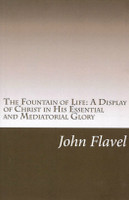
Flavel, John
Description
This theological classic examines the particular significance of Jesus Christ as King. Nineteenth century pastor and theologian William Symington makes that case that Christ is reigning now and that all nations must answer to Him, and it is the Church's responsibility to make that call on the nations, their governors, and their governed.